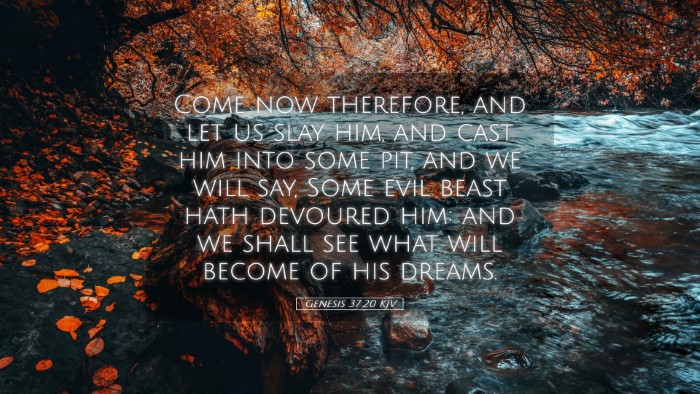Commentary on Genesis 37:20
Genesis 37:20 states: "Come now, therefore, and let us slay him, and we shall see what will become of his dreams."
This verse is situated during the betrayal of Joseph by his brothers, a pivotal moment in the narrative of Genesis that sets the stage for the unfolding of divine providence.
Contextual Overview
The backdrop of this verse is critical for understanding its significance. Joseph, favored by his father Jacob and despised by his brothers, experiences the full weight of sibling envy and hatred. His dreams, which foretold his future exaltation, exacerbate his brothers' jealousy, prompting them to conspire against him.
The Motives behind the Conspiracy
Jealousy and Rivalry: The primary motive behind the brothers' actions is jealousy. This emotion is a recurring theme in scripture, providing a cautionary tale regarding the adverse effects of such sentiments.
Matthew Henry explains that their perception of Joseph’s dreams as a threat to their own status is what incites this drastic proposal.
Divine Sovereignty: Despite the brothers’ malicious intentions, commentators like Albert Barnes emphasize that this moment illustrates God’s sovereignty. The act of plotting Joseph's death ironically becomes a step in God's plan for saving many lives during the forthcoming famine.
Analysis of Their Plan
The suggestion to "slay him" is a reflection of the severity of their anger and speaks to how unchecked emotions lead to destructive decisions. Adam Clarke notes that their solution is not only cruel but also reveals their profound moral decline.
-
Brutality and Evil Intent: The proposed murder demonstrates the depth of their hostility. The phrase "let us slay him" displays a chilling willingness to commit fratricide, denying the brothers’ familial bond in favor of their sinful desires.
-
Implications on Future Generations: Their actions also set a precedent for patterns of sinful behavior that extend beyond this narrative, affecting the entire lineage of Jacob's descendants.
Interpreting "What Will Become of His Dreams?"
The question posed by the brothers reveals their misunderstanding of the dreams Joseph shared. They not only seek to kill Joseph but also to extinguish the dreams they view as threats to their place within their family and society.
Both Henry and Clarke highlight how this reflects a common human tendency to believe that earthly actions can thwart divine purposes.
Theological Implications
Human Agency vs. Divine Purpose: This verse invites theological reflections on human agency and divine purpose. The brothers' intentions stand in stark contrast to God’s overarching plan. Their actions underscore a fundamental truth: human decisions, even those rooted in wickedness, cannot foil God's sovereign will.
God’s Faithfulness: As theologians will point out, God's faithfulness remains intact even when human betrayal reigns. Joseph, although momentarily forsaken, would ultimately rise to power in Egypt, allowing him to save his family and fulfill the prophetic dreams given to him.
Conclusion
Genesis 37:20 serves as a poignant reminder of the complexities of human emotions and the reality of sin's destructive power.
The interplay between jealousy, betrayal, and divine providence invites readers—pastors, students, and scholars alike—to reflect on their implications in both personal lives and broader theological narratives.
As we conclude, let this verse serve as both a warning and a source of hope, reminding us that even in the darkest moments, God’s plans remain firm and unshakeable.


